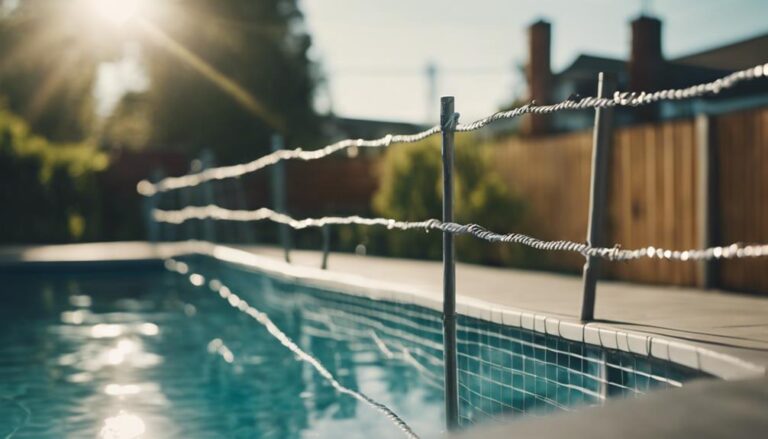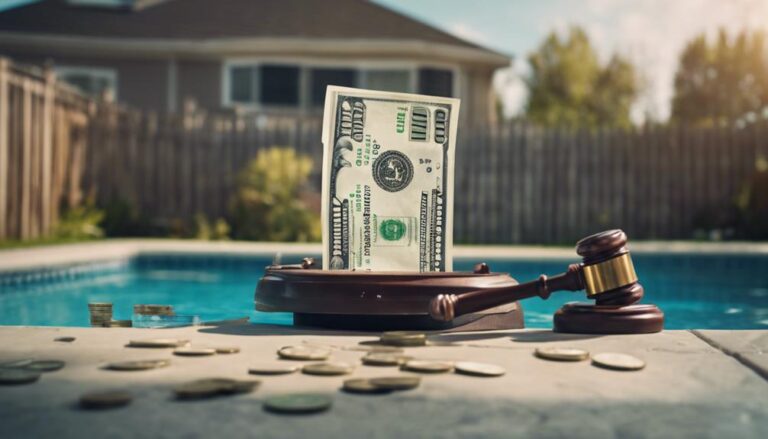Ensuring Family Safety: Essential Pool Fencing Tips
You know what they say: 'Safety first.' And when it comes to your family's well-being, nothing should be taken lightly. That's why ensuring the safety of your loved ones around the pool is paramount.
In this discussion, we will explore essential pool fencing tips that will not only meet legal requirements but also provide the highest level of protection for your family. From understanding the importance of pool fencing to the different types of materials available, we'll cover everything you need to know to make an informed decision.
So, let's dive into the world of pool fencing and discover how you can create a safe and secure environment for your family.
Importance of Pool Fencing
Installing a pool fence is essential for ensuring the safety of your family and preventing accidents around the pool area. One of the advantages of removable pool fencing is that it offers flexibility. You can easily remove or reposition the fence as per your needs. This is especially useful if you have limited space in your backyard or if you want to use the pool area for other purposes occasionally.
Removable pool fencing also allows you to maintain the aesthetic appeal of your backyard, as it doesn't obstruct the view or block natural light.
However, there are common mistakes that you should avoid when it comes to pool fencing. Firstly, make sure that the fence is at least four feet high, as recommended by safety experts. Anything shorter than that may not provide adequate protection.
Secondly, ensure that the fence has a self-closing and self-latching gate. This will prevent children from accidentally leaving the pool area unsupervised.
Additionally, regularly inspect the fence for any damage or wear and tear, and promptly repair or replace any broken parts.
Legal Requirements for Pool Fencing
To comply with legal requirements, it's important to ensure that your pool fence meets specific standards and regulations. Pool fencing regulations vary depending on your location, so it's crucial to familiarize yourself with the requirements in your area.
One key aspect to consider is the pool fence height. The height of your pool fence is typically regulated to prevent unauthorized access and ensure the safety of young children. Most regulations require a minimum fence height of 4 feet, although some areas may have higher requirements. It's important to note that the height is measured from the ground level on the outside of the fence.
Additionally, regulations may specify the type of materials allowed for pool fencing, such as metal or glass. Other requirements may include the spacing between fence panels, the presence of self-closing and self-latching gates, and the absence of climbable objects near the fence.
Types of Pool Fencing Materials
There are several different materials that can be used for pool fencing, each with their own unique advantages and considerations. When choosing the right pool fencing material for your budget and style preferences, it's important to consider the pros and cons of each option.
One popular material for pool fencing is aluminum. Aluminum fences are durable, low-maintenance, and resistant to rust and corrosion. They're also available in a variety of styles and colors, allowing you to find one that matches your aesthetic preferences. However, aluminum fences can be more expensive than other materials, and they may not provide as much privacy as other options.
Another common choice is vinyl fencing. Vinyl fences are affordable, easy to install, and require little maintenance. They're also resistant to fading and discoloration. However, vinyl fences may not be as durable as other materials and can be prone to cracking in extreme weather conditions.
For those seeking a more natural look, wood fencing is a popular option. Wood fences can be customized to fit any style and provide excellent privacy. However, they require regular maintenance, such as staining or painting, and can be susceptible to rot and pest damage.
Ultimately, choosing the right pool fencing material depends on your specific needs and preferences. Consider your budget, desired level of privacy, and maintenance requirements to make an informed decision that ensures the safety and aesthetics of your pool area.
Key Features to Consider in Pool Fencing
Consider these key features when choosing pool fencing for your property.
Pool fencing installation and design are crucial aspects that ensure the safety of your family and minimize the risk of accidents.
Firstly, the height of the pool fence is of utmost importance. It should be at least four feet tall to prevent children from climbing over it. Additionally, opt for a fence with no horizontal bars or footholds, as they can provide leverage for climbing.
Secondly, the material used for the pool fence is essential. Look for durable materials that can withstand harsh weather conditions, such as aluminum or wrought iron. These materials aren't only strong but also require minimal maintenance.
Next, consider the gate design. Ensure that the gate is self-closing and self-latching, with the latch positioned out of reach of children. This will prevent the gate from being left open accidentally and ensure that it securely closes after each use.
Another key feature to consider is the visibility of the pool fence. Opt for a design that provides clear visibility of the pool area, allowing you to monitor activities from a distance. This is particularly important for families with young children.
Lastly, make sure that the pool fence complies with local regulations and safety standards. It's essential to familiarize yourself with the legal requirements regarding pool fencing in your area to ensure compliance and avoid any potential penalties.
Maintenance and Upkeep of Pool Fencing
Maintaining and caring for your pool fencing is essential to ensure its longevity and effectiveness in keeping your pool area safe and secure. Regular maintenance and timely repairs are necessary to address any issues that may arise with your pool fence installation. By following a few simple steps, you can keep your pool fencing in excellent condition for years to come.
First, it's important to regularly inspect your pool fence for any signs of damage or wear. Look for loose or broken panels, hinges, or latches. If you notice any issues, it's crucial to address them promptly to prevent any potential safety hazards.
Additionally, keep your pool fence clean by removing any debris or dirt that may accumulate. Regularly clean the fence using a mild detergent and water, and rinse it thoroughly to remove any residue. This will help maintain its appearance and prevent damage caused by dirt buildup.
If you encounter any significant damage or are unsure about the repairs needed, it's recommended to consult a professional. They can assess the condition of your pool fence and provide the necessary repairs or replacements to ensure its continued effectiveness in keeping your pool area safe.
Conclusion
In conclusion, ensuring the safety of your family around the pool is of utmost importance. By following legal requirements and installing a secure pool fence, you can minimize the risk of accidents and provide peace of mind.
Choose the right materials and consider key features to ensure the effectiveness of your pool fencing. Regular maintenance and upkeep will also contribute to the longevity and functionality of your pool fence.
By taking these steps, you can enjoy your pool while keeping your loved ones safe.
6 Best Safety Solutions for Brisbane Families

